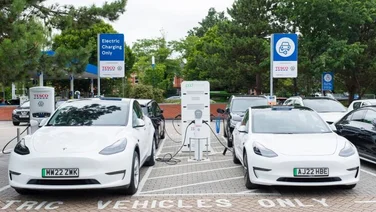- Fertility rates plummet amid climate and cost-of-living crises
- 43% of Millennials willing to have fewer children due to worsening environment
- A quarter of Gen Z think likewise

Climate change is causing almost half of Millennials to consider having fewer children as the UK’s fertility rates slumps to an all-time low, according to data from the 2024 National Home Energy Survey (NHES).
The NHES, which surveyed 2,184 UK adults in June 2024, found that 43% of Millennials – people born between 1981 and 1996 – would be willing to have fewer children due to the effects of climate change.
Additionally, the NHES found that as many as 19% of Millennials had already decided to have fewer children and were planning to have smaller families than they otherwise would like.
Driving factors for this are worries about the cost of having large families and also a belief that having fewer children is the responsible thing to do.
These figures are similar when it comes to Gen Z – those born between 1997-2012 – with 25% saying they would be willing to have fewer children than they would otherwise like; 36% said they would be willing to or have already done so.
However, as Millennials are more likely to be of the age where they would be choosing whether or not to start a family, the figures are particularly relevant.
They are also consistent with a broader trend across society to have fewer children for environmental and financial reasons.
Data released by the Office of National Statistics (ONS) shows that the birthrate in England and Wales is at its lowest for almost 50 years.
According to the ONS, in 2023 there were 591,072 births in England and Wales, the lowest number since 1977. It is the first time that the number of live births has dropped under 600,000 since 2002.
Additionally, the data shows that total fertility rates (TFR) have dropped to 1.44 children per woman, which is the lowest on record.
Fighting climate change is a priority for the government, and since his party’s victory in the general election in July 2024 Prime Minister Sir Keir Starmer has sought to improve the UK’s energy independence and roll out low-carbon technology (LCT) to households across the country.
While this is welcome, the NHES has also found that roll out is held back by a lack of awareness of grants and government support.

Are Millennials worried about climate change?
It’s impossible to say for sure if the rate of climate change is the driving factor behind the collapse in fertility rate, but it is an area that requires examination.
When asked if they think we are currently experiencing a climate change emergency, more than half – 51% – said yes, which is the same as the average across all age groups.
That number is even greater when applied to Gen Z, 61% of whom believe we are in the middle of a climate crisis.
However, while Millennials and Gen Z are worried about climate change, overall, the proportion of people overall who answered yes fell by 22% year-on-year (YoY) from 2023.
When asked what particular areas of climate change they are most concerned about, the most popular answer overall was ‘Rising food prices and food insecurity’ at 64%, and this suggests that cost pressures are also a big factor when it comes to how people interpret climate change.
Greg Ceely, head of population health monitoring, the ONS, said the biggest drop in fertility rates had come in those aged between 20 and 29, in other words younger Millennials and older Gen Z.
Maximilian Schwerdtfeger, content manager, The Eco Experts, said:
“This data is alarming because it shows how climate change affects people’s willingness to settle down and start families, which in turn suggests a collective pessimism in regards to society’s ability to overcome the climate crisis.
“Combined with the findings from the ONS, these figures show that the government must accelerate its efforts to get the country to net-zero and work with international partners to ensure people have the confidence to have the families they want.”
Roland Ellison, editor of The Eco Experts, said it is “not surprising” that Gen Z and Millennials are increasingly choosing to reduce the planned size of their families because of climate change.
“Climate change is a gloomy outlook for the future and our findings show it is a driver behind people considering having fewer children.
“We must not forget that many are being priced out of the housing market and facing a tough job market with low wage growth. This ultimately makes taking on the extra responsibility of dependents a less attractive proposition.”






